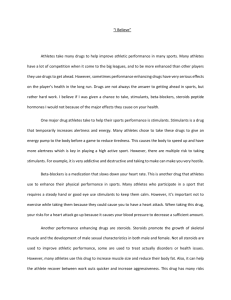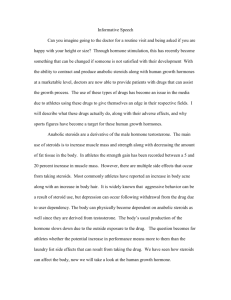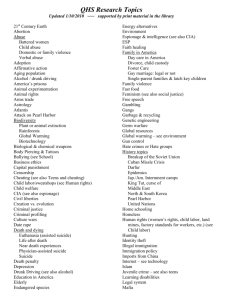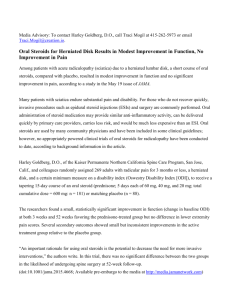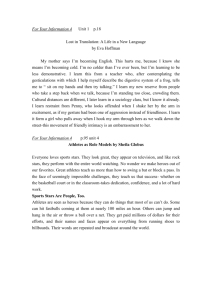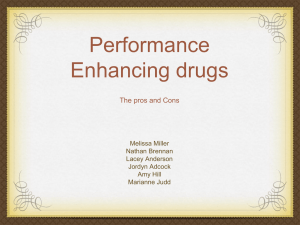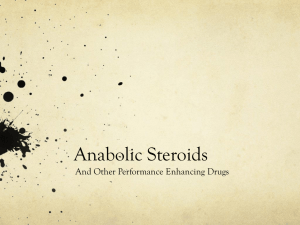Final Draft Argument Essay.doc - Jared Ostler E
advertisement
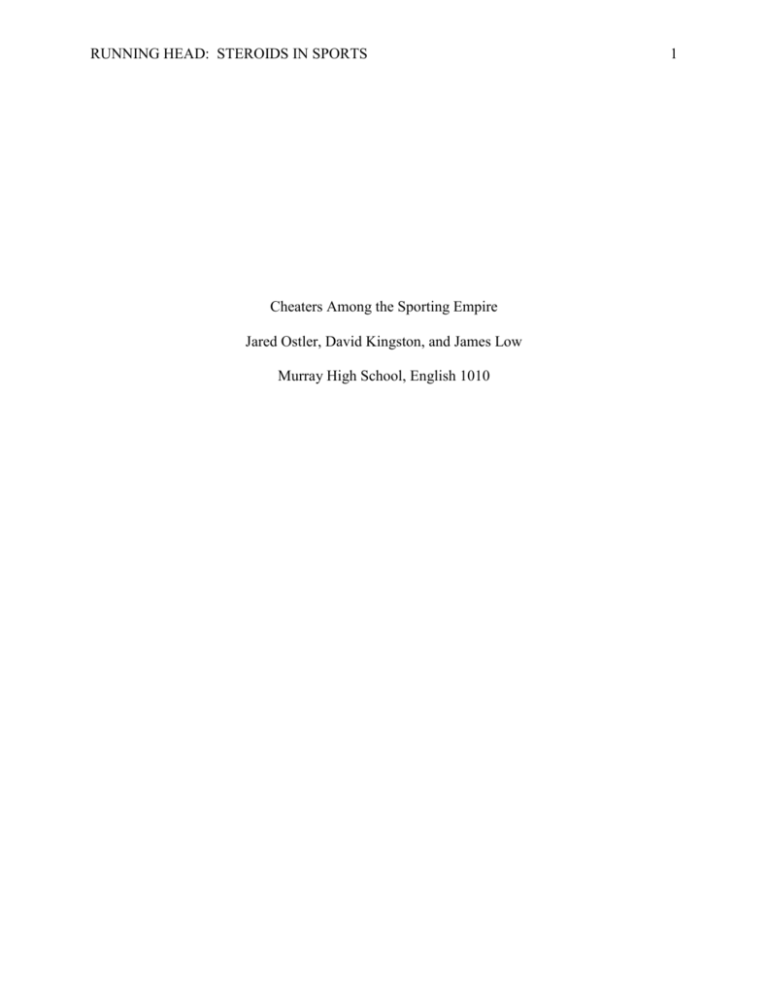
RUNNING HEAD: STEROIDS IN SPORTS Cheaters Among the Sporting Empire Jared Ostler, David Kingston, and James Low Murray High School, English 1010 1 STEROIDS IN SPORTS 2 A quote by Lou Brock, an ex professional baseball player, says, “We have to make some radical move to get the attention of everyone. Cheaters can’t win and steroids have put us in the position that it’s OK to cheat.” This is a significant problem that people in this society are faced with. The use of steroids in sports is giving people the idea that cheating isn’t bad which. This distorts the ethical normality of a lot of today’s society. In order to have a more honest society, this issue has to be changed as soon and quickly as possible. With all of this in mind, a question is raised: should the use of steroids in sports be allowed to level the playing field? The use of steroids in sports should not be allowed because of the physiological and mental effects of them. To solve this problem, testing for steroids should be more vigorous and frequent with harsher punishments being given out to athletes who test positive for them. The issue of steroid use in sports is an issue that has affected our society for almost 100 years now. In the 1930’s and 1940’s steroids were first discovered to boost muscle performance in athletes and were only used by select people. Since the advancements of technology and the increase in curiosity, the use of steroids by athletes in this modern age of sports has skyrocketed to levels that once seemed impossible. The pressure that athletes are put under to succeed and be the best is why they have become more open to the use of these performance enhancers. The expansion of the variety of steroids has been a result of this issue as well. This is why we need to encourage better testing for steroids in all sports and get rid of them and their users all together. Because of the increase in pressure to succeed and the reward of money for doing well, more and more athletes are turning to steroids to give them some kind of physical edge over their opponents. This is precisely the reason why the issue of steroids in sports is so problematic. In the article “Doping in Sports is Sad Dose of Reality” written by Rob Hughes (2012), the author STEROIDS IN SPORTS 3 says, “East-West, and any way you look at it, this temptation to boost performance by drugs is prevalent.” (p. 1) In this passage, it is easy to see that this is a problem that is affecting not just the United States sporting empire but the whole world. What started as an issue involving very few people and a couple of countries has grown into a worldwide issue. When this view is taken on an issue such as this one, it becomes obvious to see why our society has a growing problem. Professional sports isn’t the only area where athletes are affected either. As a result of the desire to be the best at their sport and to receive scholarships to universities and colleges, increasingly more high school athletes are making the decision to get involved in steroids to boost their performance. The increase in more professional and student athletes using steroids is why this problem is such a significant one. This is changing the morals and standards of people in this modern era of sports giving the impression that cheating is fine as long as someone doesn’t get caught doing it. This can be shown in the article “Doping Has No Place in Sports” written by Fay Vincent (2010), when he said, “…Athletic contests are defined by rules and without them there can be no fair contest. Cheating involves the denial of the primacy of the rules and must be condemned…” (p. 1) This is exactly why the use of steroids is considered cheating and must be treated that way. All people who use steroids should be punished in a way that is appropriate for any kind of cheater no matter what sport they participate in. If cheaters do not receive the appropriate consequences for their actions, then other people will think that it’s alright to cheat because the consequences for it aren’t that bad. This encourages athletes to break the rules to give themselves an advantage knowing the risk and consequence of getting caught. That is why this has turned into such a significant problem in this society. STEROIDS IN SPORTS 4 What is it that causes athletes to make this decision to use steroids, and what are the harmful consequences of steroids? The greatest cause of this problem can best be described by Fay Vincent (2010) when he says, “At the core of all this is money. Extraordinary performance is rewarded with astonishing financial contracts.” (p. 2) This is the primary cause of steroids in professional sports and the thought in mind of an athletes’ future when they use steroids at young ages. Another quote that makes the same point comes from Rob Hughes (2012) when he speaks about the Olympics and says, “Any purity went out of the Games when money became its god.” (p. 2) The point being made by both writers is that money is the major influence on athletes to use performance enhancing drugs. The reward of money is so influential on an athlete that they will do anything to be the best and get paid caseloads of money for it. The detrimental effects on their bodies are often overlooked when they decide to use steroids. The many side effects of steroids are shown in Figure 1 to the right, and in an article written by Elizabeth Quinn (2011) entitled “Steroid Use Continues Despite Health Risks to Athletes.” Some of the possible health risks that she lists in this article are tendon ruptures, high blood pressure, heart attacks, cancer, and roid rage (extreme aggression). With so many life-threatening effects of steroids, it’s a wonder why athletes would risk their health to have an improvement in performance. Figure 1: muscleandstrength.com STEROIDS IN SPORTS 5 Steroid use is a growing problem in the United States. The reason that it is growing is that the restrictions are very small. In most professional sports if the athlete is caught using drugs they will be stripped of all medals and awards they have won but nothing and sometimes a suspension. Coaches will even lie about drug test or help them pass them in some way because they don’t want to lose their star athletes and because if they get caught it could be bad news for the coaches because they are the ones giving the athletes the steroids. Using steroids in professional sports is cheating and is like having a list of answers next to your desk on a final exam. A big philosophy with it is if you can’t do or perform at the level needed to win without the use of drugs you shouldn’t be using them. Using steroids is also very bad for your health. Steroids if taken by females can cause their voices to deepen and facial hair to grow. Men may have prominent breasts, baldness, shrunken testicles, and a lot of other sideeffects and problems. So if any of this sounds fun, go right ahead and do steroids. Now with this knowledge there are some people out there that think that steroids in sports should be legal but with that there are still restrictions. One view point to look at is that legalizing steroids would actually lower risks of athletes. Adrianne Blue (2006) said in her article “It’s the Real Dope” “because athletes use steroids that are not regulated and are sold and used underground, raise the risk of overdosing or causing irreparable damage. If steroids were to be legalized the right dosage and formula would be given to athletes to make sure there would be no problems.”(p.18). Other things people say is that steroids that athletes are using will kill them Dr. Butterfield doesn’t believe this his view on it is "steroids do damage your body but the way the professional athletes use them is not life threatening" Some say that sports would be so much better without steroids and that we need to get rid of them. The main problem with that is steroids have been in use since 1904 and are still in use STEROIDS IN SPORTS 6 today. So looking at the big picture steroids have been in use for over a hundred years and are most likely to never go away. So the biggest question that needs to be asked is why fight steroid use when people could control it and save lives? There are many people who think that the soul reason steroids should be used in sports is because it makes the games more entertaining and thrilling to watch. In his article “Fans of the Juice,” Eugene Robinson (2007) makes the point that people watch professional sports to watch professional athletes “perform extraordinary physical feats” (p.32) that people like themselves can’t do. They want to see someone different from themselves. With all of the professional athletes growing faster, stronger and breaking world records it causes pressure. When people are under pressure they look for a relief in some way and when they do it is usually to steroids. That way getting to the next skill level will be easier and less stressful. Who couldn’t use a little less stress in their life? The problem of steroids infecting the American sports teams has been growing into a huge problem. Especially over the last few years, people have been stripped of titles and thrown out of the profession for having been tested positive for steroids. Many people wonder if the performance is real, or if it is all drugged up performance. Sports Team officials have probably tried just about everything, but when it comes down to it the players just have to keep high ethics for the sports they play. Canadian Newspaper “The Toronto Star” says that baseball’s hall of fame can soon be counted as irrelevant. Due to the wide spread use of steroids records set could just be from performance drugs and not true records. The star says that the fans of many players that are accused are becoming skeptical so to speak on whether they are still a fan or not. Many fans suspect that anyone who is doing very well in their sport to be using performance enhancing STEROIDS IN SPORTS 7 drugs. “The Toronto Star” says that there could be a solution to the “dissolving relevance” (p.1) of sport’s team players. They suggest two areas of the hall of fame where records were set without the use of steroids and records that have been set by an athlete that has used steroids. Could this possibly encourage players to play clean? (Toronto Star, 2007) Using the steroid drugs can unfairly put the advantage to one team. Many fans are making wagers to what side will win. Sponsors pay millions to help their teams win. If the field is not even the game could be over before it is started. Newspaper reporter from the “Richmond Times-Dispatch” Paul Woody says that many athletes get accused that have not taken the drug. One in particular named Roger Clemens took the case to the Supreme Court. Why, if the players knew how much their reputation could be at stake would they still take the drug? (Woody, 2008) Reporter Noah Adams says that some people want to allow the drug so that nobody has to worry about things being even. He explains how the trouble can be taken away if the drugs were allowed in the sports. Mike Jasper columnist says “We all want to see a pumped up performance anyway.”(p.1) Should there be a tolerance to the drug? Should we allow the drugs to be distributed amongst the sports teams of today? Many fans believe that the use of steroids is very unfair. Lowering the sports’ teams’ standards could just make things much worse. Athletes that are using the drug contribute more to the wonder that many fans most certainly have about who is clean and who is on drugs. Some people say that changing the season will discourage use others say that simply denouncing the use of steroids publically will do the trick. Either way something must be done for the growing problem in sports for players using steroids. This problem can get people into serious trouble, athletes and fans. There must be a good solution to this problem. (Posanski, 2011) STEROIDS IN SPORTS 8 Everyone knows that unless the world was perfect the issue could not be eliminated entirely. There are many solutions to the issue, but seemingly none of them have really worked. The officials of the sports teams must do something more. Things must be tightened up, especially the testing. There has to be people that are paid for catching users of the drugs that will more extensively test so that users will be discouraged to use the steroids. These people that test cannot be from the same sports team that is being tested otherwise testers would be bias towards their own team. If every team player was tested often they should have a pay incentive if they come clean every test. Having more extensive testing must be followed with greater consequence for the players who are caught using the drugs. If players knew that they would be publically humiliated after inevitably being caught maybe they would want to get better without the use of enhancement drugs. The key words here are “inevitably being caught” from more extensive testing. Players should be stripped of their medals if they are caught using the drug and depending on the severity of the drug use they should be taken out of the sport. All of this will without a doubt could cost a fortune, but the sporting world needs to stop overpaying their cheating athletes and budget more of their money to find the cheaters. They should only pay the good, clean playing athletes. In conclusion, steroids should not be allowed in sports and testing for them should be done more often. If an athlete tests positive for steroids, they should have a severe punishment placed upon them as a result of their actions. Athletes should be responsible for obeying all rules involved in the sport they play. To make athletes less likely to use steroids, money needs to take on a lesser role in influencing athletes. In order to keep sports clean in a society that worships them so much, major change is needed. Everyone can take part in solving this problem, they just STEROIDS IN SPORTS need to find where they stand on the issue and what they think should be done to fix it. That’s why people need to stand up for what they think and argue for change. 9 STEROIDS IN SPORTS 10 Sources Blue, A. (2006, August 14). It’s the real dope. New Statesman. Retrieved from book Butterfield, R. (2012, May 11). Interview on views on steroids Hughes, R. (2012, January 7). Doping in sports is sad dose of reality. Straits Times (Singapore). Retrieved from SIRS Jasper, J. (2000, September 29). Allow all athletes to use performance-enhancing drugs to even out competition and eliminate testing. All Things Considered. Retrieved from EBSCOhost Posnanski, J. (2011, August 29). The 154-game solution. Sports Illustrated, 115(8), 68. Retrieved from EBSCOhost Quinn, E. (2011, October 24). Steroid use continues despite health risks to athletes. Health’s Disease and Condition. Retrieved from http://sportsmedicine.about.com/od/performanceenhancingdrugs/a/AnabolicSteroid.htm Robinson, E. (2007, December 18). Fans of the juice. The Washington Post. Retrieved from http://www.washingtonpost.com Toronto Star (2007, December 21). Two-tier hall could resolve ‘roids crisis. Toronto Star (Canada). Retrieved from EBSCOhost Vincent, F. (2010, May 24). Doping has no place in sports. Wall Street Journal. Retrieved from SIRS Woody, P. (2008, February 17). Paul Woody column. Richmond Times-Dispatch (VA). Retrieved from EBSCOhost
